Difference between revisions of "Tanner"
(→Profession tanner) |
|||
| Line 4: | Line 4: | ||
| − | == | + | ==Tanning profession== |
| − | Previously there were [[tannery|tanneries]] and tanners in almost every city. Today there are | + | Previously there were [[tannery|tanneries]] and tanners in almost every city. Today there are very few tanneries and the profession of a tanner is rarely taught. [[Leather production]] involves multiple processes which is why there are many different jobs in a tannery. |
| Line 17: | Line 17: | ||
<p> </p> | <p> </p> | ||
| − | + | There's an old saying: "In the leather process the main thing is the stench: lime, alum, salt, flour, arsenic make it quite white and beautiful. Egg yolks, piss and dog poop give it a special smoothness. Therefore, it is a high-sweet, the tender kiss on the white womens' [[Leather gloves|glove]]. " | |
| Line 29: | Line 29: | ||
| − | Many people | + | Many people associated tanning with a strong stench and toxic chemicals. But these times are long past. Modern tanneries are almost odourless and tanners no longer have to worry about a shorter life expectancy. Some of the production [[Leather production|processes]] require high physical strength. Leather skins from [[Cow leather|cattle]] are not only [[Measures and weights|large]] but also soaked with water, making them very heavy. |
| − | + | ||
| − | + | ||
| + | Since [[Tanning leather|tanning]] involves handling a natural product, the work is always a challenge for the tanner. Many [[Leather production|processes]] in the tanning industry have to be adapted to the natural material in order to produce the [[leather quality|best possible]] leather. Nowadays, tanning is a respected profession and tanners must constantly expand their knowledge in order to keep up with the latest technology. | ||
==Vocational training for tanners== | ==Vocational training for tanners== | ||
Revision as of 15:14, 16 March 2017
Contents
Tanning profession
Previously there were tanneries and tanners in almost every city. Today there are very few tanneries and the profession of a tanner is rarely taught. Leather production involves multiple processes which is why there are many different jobs in a tannery.
Traditional tanners in London (www.colourlock.com)
There's an old saying: "In the leather process the main thing is the stench: lime, alum, salt, flour, arsenic make it quite white and beautiful. Egg yolks, piss and dog poop give it a special smoothness. Therefore, it is a high-sweet, the tender kiss on the white womens' glove. "
Many people associated tanning with a strong stench and toxic chemicals. But these times are long past. Modern tanneries are almost odourless and tanners no longer have to worry about a shorter life expectancy. Some of the production processes require high physical strength. Leather skins from cattle are not only large but also soaked with water, making them very heavy.
Since tanning involves handling a natural product, the work is always a challenge for the tanner. Many processes in the tanning industry have to be adapted to the natural material in order to produce the best possible leather. Nowadays, tanning is a respected profession and tanners must constantly expand their knowledge in order to keep up with the latest technology.
Vocational training for tanners
The education of the profession of a tanner is very depending on national regulation and laws. Local tanneries and the national leather institutes know the procedure. However, a basic school education and a well-developed technical understanding should always be available before starting this profession.
Leather technicians
A leather technician is above the tanner in the tannery hierarchy. A leather technician is more experienced and has more experience, better knowledge and greater responsibility. Also, this occupational title will be called and handled different in every country.
Tanner baptism - Tanner fountain
It is a tradition that tanner or leather technicians after their graduation go through the tanner baptism. This was done at a local well or in a large container. The graduates are immersed in the water in full dress. A humid-joyful event as a celebration of the successful completion of the education.
Additional information
Videos about the leather production
The leather production in a modern tannery.
The leather production with tannins of the oak.
Chamois leather production in Germany.
| Tanning methods |
|---|
| Chrome tanning - Vegetable-tanned leather - Synthetic tanning - Tanning with fats and oils |










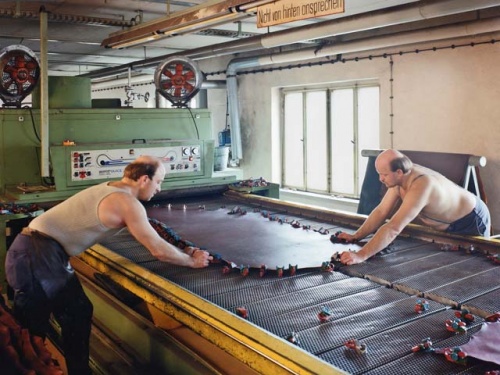
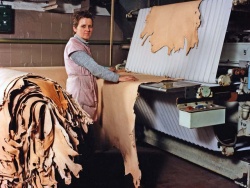
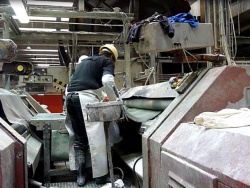
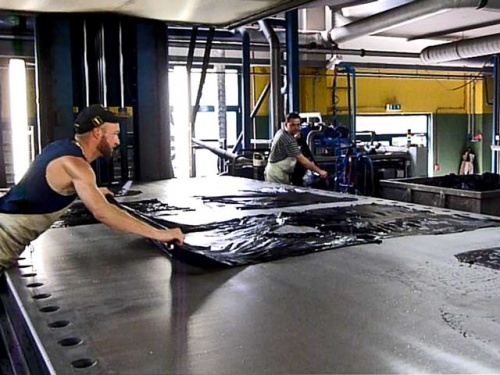
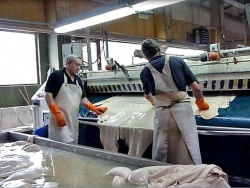
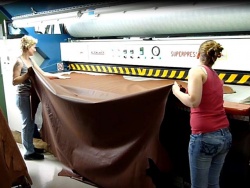

 a kotori web solution
a kotori web solution